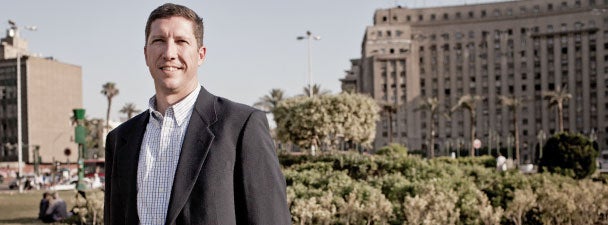
Susan Ray ’91 stared in disbelief at the piece of paper in her hand.
“No name. No Seat. Free,” was printed on the ticket from Turkish Airlines.
Then, it was time to go. Gathering her three children, Sue turned to her husband, Lt. Col. William “Bill” Ray ’94, and said goodbye. They were leaving Egypt, but Dad was remaining behind to help staff the U.S. Embassy during a time of crisis. For the last week, massive protests had brought the country to a standstill. Egyptians, frustrated by decades of corruption and a great disparity in wealth, demanded that longtime President Hosni Mubarak resign. As crowds packed Cairo’s Tahrir Square (seen below) day after day and night after night, people the world over wondered when the protest might turn violent.
The Rays had arrived in Egypt in July 2009, when the Air Force assigned Bill Ray to the Cairo embassy as an F-16 and munitions program officer within the Office of Military Cooperation. While he met with Egyptian military officers as a liaison for the Air Force and American military contractors, his family explored Cairo, with the kids even attending the same school as one of Mubarak’s grandchildren. They made friends with expats and Egyptians alike, enjoying the exotic and hospitable culture.
It was on January 25 – when protesters crowded into the square and a standoff between Egyptian residents and authorities ensued – that everything changed. Communications went down, including phone and Internet service. The Rays, like other U.S. government employees and their families, relied on embassy-issued radios to stay in touch. While Bill Ray reported for work, helping Americans evacuate through Cairo’s airport, his family stayed home, watching television and keeping close to, if not inside, the house’s safe room.
By January 31, with the unrest showing no signs of abating, it was time for most of the Rays to fly home. After saying goodbye to his family, Bill returned to Cairo and began working long shifts at the U.S. Embassy. He and colleagues stood on the rooftop to watch the protest – even witnessing spurts of fighting as protesters and Mubarak supporters fired guns, threw Molotov cocktails and marauded around on horses and camels.
The violence was short-lived, however, as the Egyptian military refrained from attacking protesters. Ray credits his counterparts in the Egyptian military for keeping their cool in tense circumstances.
“We were quite proud of how they handled the whole thing,” he says. “They showed a lot of restraint: very professional.”
As the protests continued, more and more Egyptians began calling for political change, including older Egyptians who had been slow to embrace the demands made by the youth leading the protests. Ray recalls how one Egyptian employee at the U.S. embassy argued with his son about joining the unrest in Tahrir Square.
“You’re not stopping me,” replied the son to his father’s demands to stay away from the protests. “If you don’t want anything to happen to me, well, you better come down with me.”
Youth triumphed, and the father accompanied his son to the protests. In fact, many Egyptians were inspired by the actions of the country’s young adults.
“The older generation will tell you they’re really proud of the kids,” he says. “They refused to cower.”
On February 11, President Mubarak stepped down from office and passed control of the country to the military. Protesters rejoiced, and Ray says Cairo took on the atmosphere of a street carnival in the days afterward, with hordes of young people then assembling to clean the streets. Before, says Ray, Egyptians were demoralized. They compared the country’s wealth to smoke – something that can be seen, but not touched. Now, there’s a sense of opportunity in Egypt, and Ray – who left the country in May to rejoin his family in Sumter, S.C., and begin a drive to his next posting at Nellis Air Force Base outside Las Vegas – is optimistic about Egypt’s future.
“I’m not apprehensive,” he says. “It’s fun to see people take ownership of their country.”
Photo by David Degner




